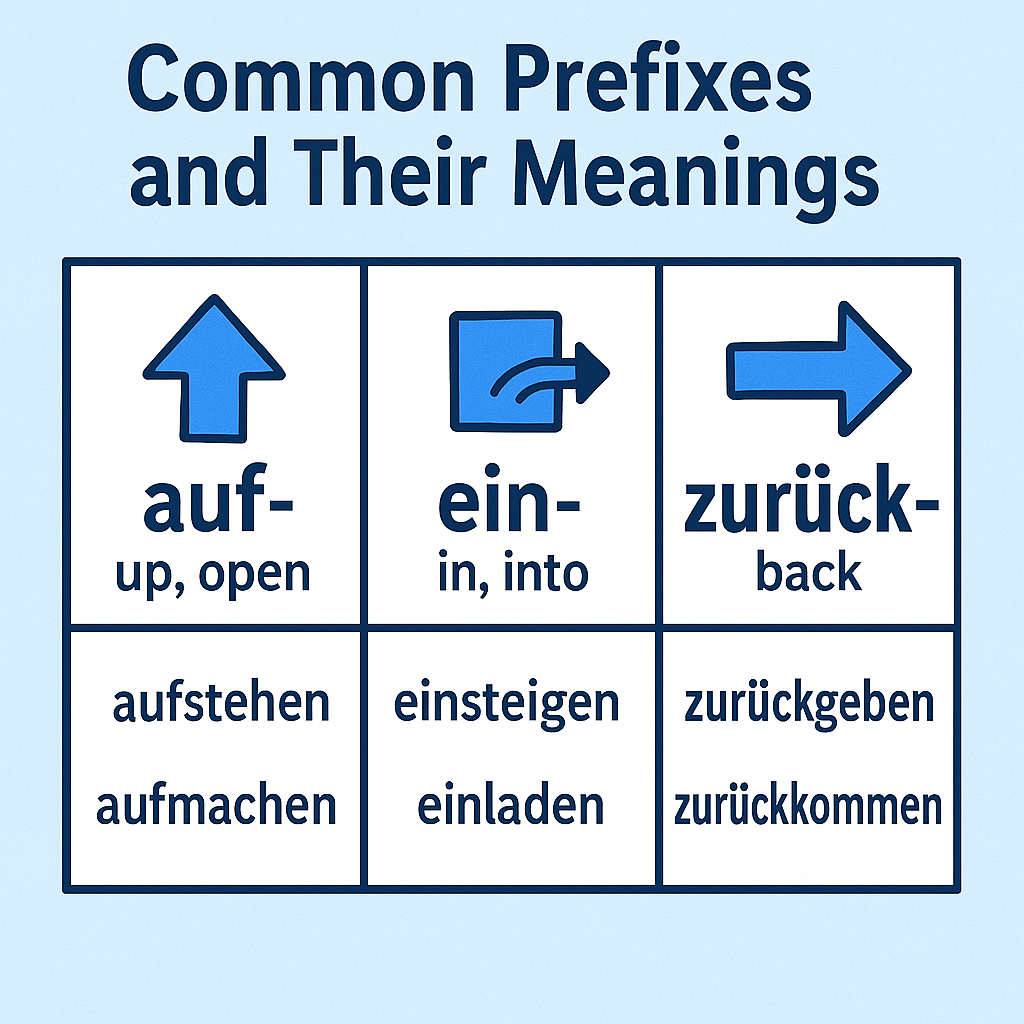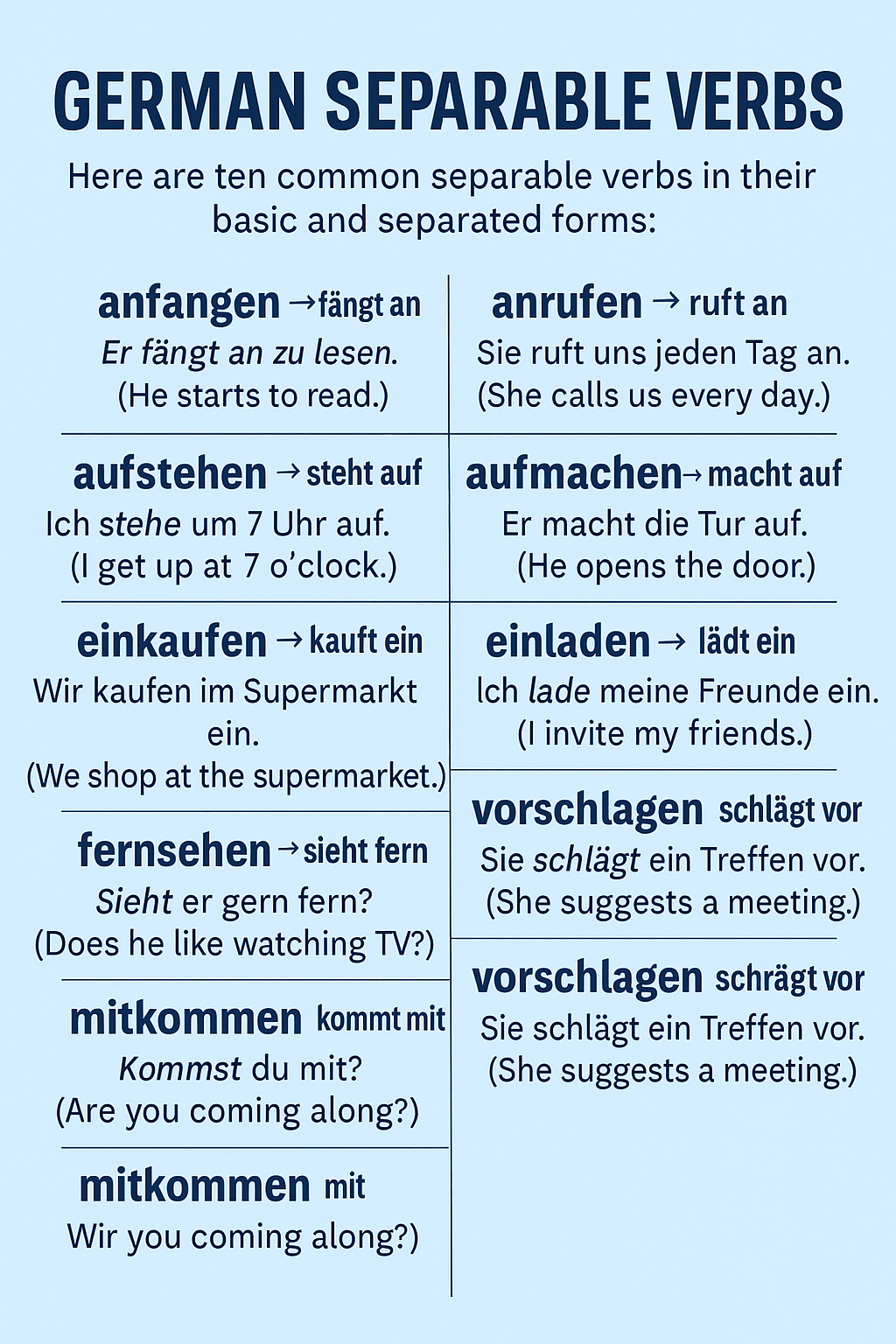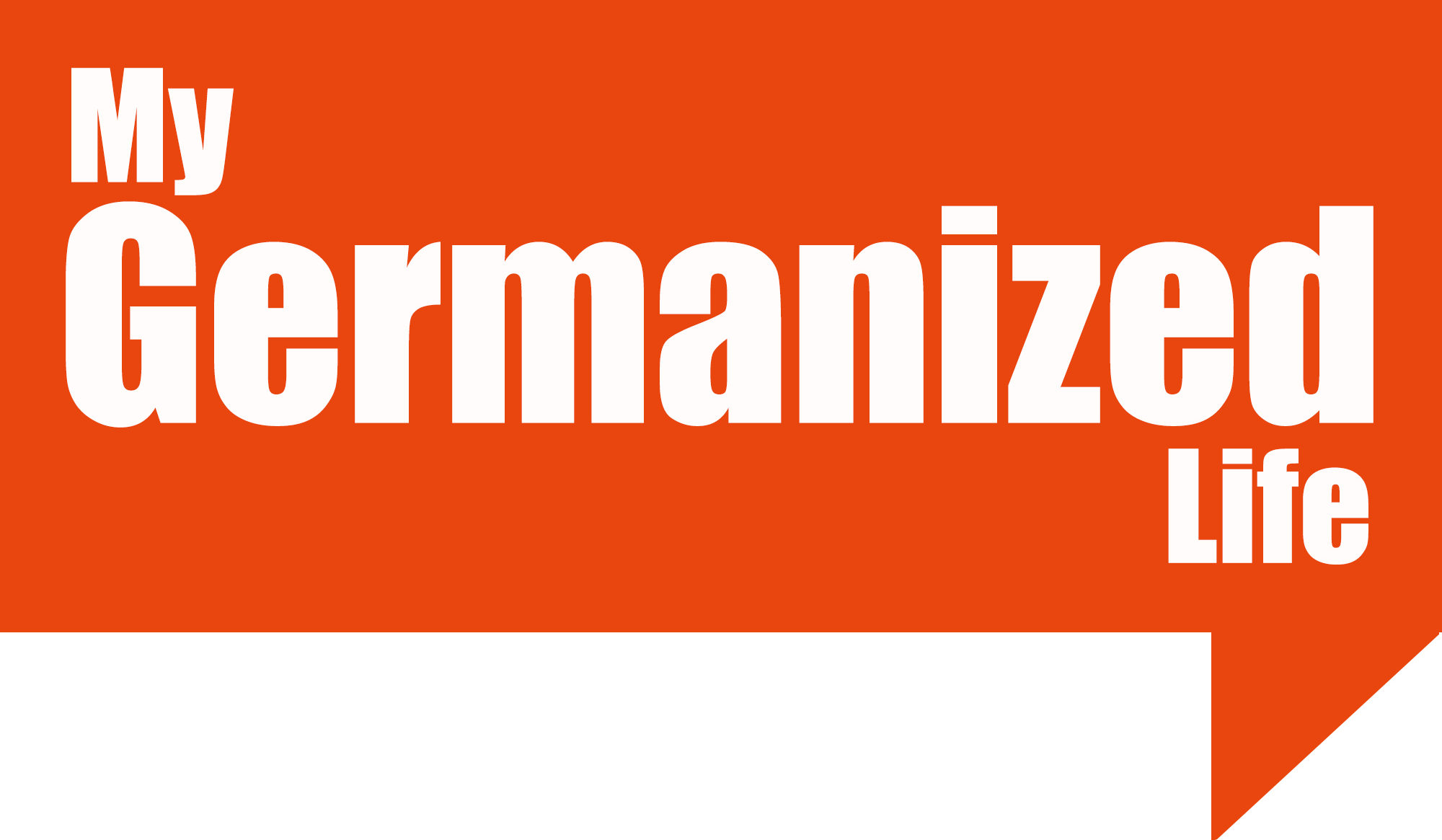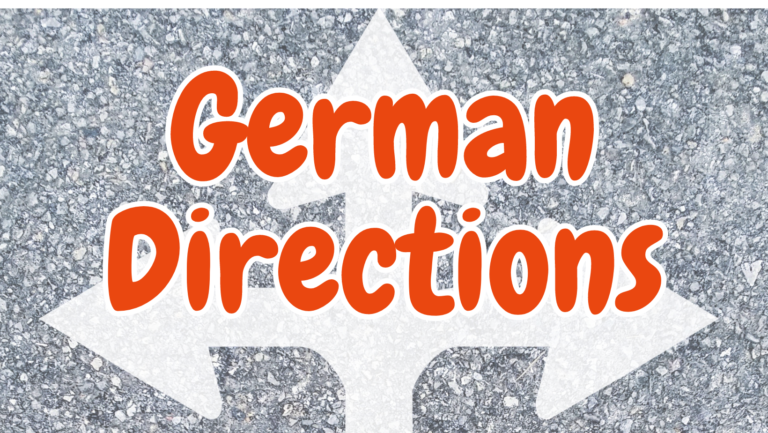
Learning German can be challenging, especially when you encounter verbs that split apart in sentences. These are known as separable verbs, and understanding them is crucial for mastering German sentence structure. In this guide, we’ll demystify German separable verbs, provide a list of the most common ones, and answer frequently asked questions to help you easily grasp this concept.
What Are German Separable Verbs?
Separable verbs in German consist of a prefix and a base verb. The prefix modifies the meaning of the base verb and detaches and moves to the end of the clause in certain tenses and sentence structures.
Example: aufstehen (to get up)
- Ich stehe um 5 Uhr auf. (I get up at 5 o’clock.)
In this sentence, auf is the prefix, and stehen is the base verb. The prefix auf moves to the end of the sentence.

Common Separable Prefixes and Their Meanings
Understanding the meanings of common separable prefixes can help you deduce the meanings of compound verbs. Here are some frequently used separable prefixes along with their general meanings and examples:
- ab-: away, off, down
- an-: at, on, to, beginning of an action
- auf-: up, open
- aus-: out, off, from
- ein-: in, into
- mit-: with, along
- nach-: after, towards
- vor-: before, forward
- zu-: to, closed
- zurück-: back
By familiarizing yourself with these prefixes, you can better understand and predict the meanings of many separable verbs in German.
20 Most Common German Separable Verbs
Here is a list of 20 commonly used separable verbs that every German learner should know:
- aufstehen – to get up
- einkaufen – to shop
- fernsehen – to watch TV
- mitkommen – to come along
- anrufen – to call (on the phone)
- aufmachen – to open
- zumachen – to close
- abfahren – to depart
- ankommen – to arrive
- ausgehen – to go out
- einsteigen – to get in
- aussteigen – to get out
- mitbringen – to bring along
- vorbereiten – to prepare
- zurückkommen – to come back
- abschreiben – to copy
- anmelden – to register
- aufhören – to stop
- einladen – to invite
- nachdenken – to think about
These separable verbs will enhance your comprehension and communication skills in German.

When and How to Separate a Verb in German
Mastering German separable verbs (trennbare Verben) requires understanding the rules of their separation in various grammatical contexts. The separation of the prefix from the base verb depends on factors such as tense, sentence structure, and the presence of auxiliary verbs.
1. Present and Simple Past Tenses (Präsens und Präteritum)
In main clauses using the present or simple past tense, the separable prefix detaches from the base verb. The conjugated verb occupies the second position in the sentence, while the prefix moves to the end.
Examples:
- Ich stehe um 5 Uhr auf. (I get up at 5 o’clock.)
- Der Zug fuhr pünktlich ab. (The train departed on time.)
This structure maintains the typical German word order, where the finite verb is in the second position, and the separated prefix is at the end.
2. Commands (Imperative Mood)
When issuing commands, the separable prefix also detaches, and the prefix goes to the end.
Examples:
- Steh jetzt auf! (Get up now!)
- Mach die Tür zu! (Close the door!)
This form emphasizes the action and maintains clarity in directives.
3. Perfect Tense (Perfekt)
In the perfect tense, the past participle of separable verbs is formed by inserting ge- between the prefix and the base verb.
Examples:
- Ich habe das Fenster aufgemacht. (I have opened the window.)
- Ich habe dich gestern angerufen. (I called you yesterday.)
- Sie ist früh aufgestanden. (She got up early.)
Here, the auxiliary verb (haben or sein) is conjugated, and the past participle appears at the end of the sentence, maintaining the separation within the participle itself.
4. Infinitive Constructions with Modal Verbs
When separable verbs are used in conjunction with modal verbs (e.g., können, müssen, wollen), the infinitive form of the verb remains intact, and the prefix is not separated.
Examples:
- Ich möchte morgen früh aufstehen. (I would like to get up early tomorrow.)
- Ich möchte dich morgen anrufen. (I would like to call you tomorrow.)
- Du musst die Tür zumachen. (You must close the door.)
In these cases, the modal verb is conjugated, and the separable verb stays together in its infinitive form at the end of the sentence.
5. Infinitive Constructions with “zu”
In constructions using zu (e.g., um…zu, ohne…zu), zu is inserted between the prefix and the base verb, and the entire verb remains at the end of the clause.
Examples:
- Ich versuche, früh aufzustehen. (I try to get up early.)
- Ich habe vergessen, dich gestern anzurufen. (I forgot to call you yesterday.)
- Sie hat vergessen, das Fenster zuzumachen. (She forgot to close the window.)
This structure is common in subordinate clauses and infinitive phrases.
6. Future Tense (Futur I)
In the future tense, or Futur I, formed with the auxiliary verb werden and the infinitive of the main verb, the separable verb remains intact, and the prefix is not separated.
Examples:
- Ich werde morgen früh aufstehen. (I will get up early tomorrow.)
- Sie wird das Fenster zumachen. (She will close the window.)
Here, werden is conjugated, and the separable verb stays together in its infinitive form at the end of the sentence.
7. Questions
In yes/no questions, the conjugated verb comes first, and the separable prefix moves to the end of the sentence.
Examples:
- Kommst du mit? (Are you coming along?)
- Machst du die Tür zu? (Are you closing the door?)
In W-questions (who, what, when, etc.), the question word comes first, followed by the conjugated verb, and the prefix still moves to the end.
Examples:
- Wann stehst du auf? (When do you get up?)
- Warum machst du das Fenster zu? (Why are you closing the window?)
Frequently Asked Questions About German Separable Verbs
How Can I Identify Separable Verbs?
Separable verbs often have prefixes that are stressed when spoken. If the prefix is stressed, it’s likely separable. Additionally, learning common separable prefixes can aid in identification.
What Happens If I Don’t Separate the Verb?
Failing to separate the verb when required can lead to confusion or misunderstandings. It’s essential to follow the rules of separation to convey the correct meaning.
Are There Verbs That Are Both Separable and Inseparable?
Yes, some verbs can be both, depending on their meaning and usage. For example, umfahren can mean “to drive around” (inseparable) or “to run over” (separable).
Final Thoughts on German Separable Verbs
Understanding separable verbs helps you master the German language. By familiarizing yourself with common prefixes, practicing regularly, and paying attention to sentence structure, you’ll gain confidence in using these verbs correctly. Remember, consistent practice and exposure are key to becoming proficient in German.







